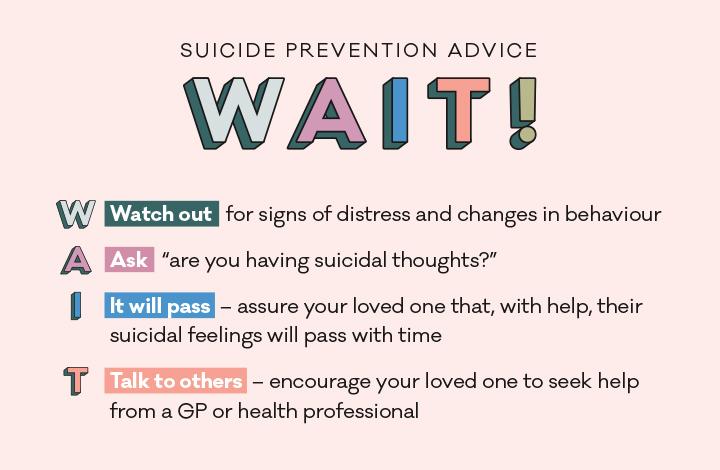When people say they’re thinking about suicide, or say things that sound like they’re considering suicide, it can be very upsetting. You may not be sure what to do to help, whether you should take talk of suicide seriously, or if your intervention might make the situation worse. Taking action is always the best choice.
The steps below can help you support your friend through a moment of crisis.
- Take them at their word: It’s a common myth that people talk about suicide to get attention. This is not the case for most people, so it’s always best (and safest) to assume your friend means what they say. Brushing off their mention of suicide invalidates their distress. They may feel reluctant to share their thoughts with anyone else or reach out for professional support.
- Pay attention to their language and behavior: People often talk about suicide in vague or unclear ways. Your friend could say things that reflect a sense of shame, hopelessness, or failure. They may not say, “I want to die,” or “I want to kill myself.” Instead, they might say:
- “I just want the pain to stop.”
- “I don’t know if I can go on.”
- “I’m a burden to everyone.”
- “I’ll never feel better.”
Their mood and actions can also show some signs: You might notice:
- avoid spending time with people
- have frequent mood changes
- sleep more or less than usual
- drink or use drugs more than usual
- take risks or behave more impulsively than usual
- give away treasured or important belongings
These signs don’t always mean your friend is thinking about suicide, but it never hurts to have a conversation when their actions or language concern you.
- Ask them directly: You can get a better idea of your friend’s immediate risk by asking a few important questions.
- First, confirm they really are thinking of suicide by asking, “Are you thinking about ending your life?”
- If they say yes, ask, “Do you have a plan for how you’d do it?”
- If they say yes, ask, “Do you already have the things you’d use?” Then ask what and where those items are.
- Check whether they have a timeline in mind by asking, “Have you thought about when you’d end your life?”
Not everyone who thinks about dying has a plan or the means and intent to carry out their plan. Someone who says yes to all of these questions and has a clear timeframe for dying, however, needs immediate support (more on this in a moment). - Encourage them to talk about it: When someone you love mentions suicide, you might believe avoiding the subject entirely and encouraging them to think about brighter things will help them feel better. It’s normal to feel scared or uncertain of the best response, but shying away from the subject won’t help. The idea that discussing suicide will make someone more likely to act on suicidal thoughts is just another myth
- Trusted Source: People who have the chance to open up about their thoughts and share their pain with an empathic listener often feel some relief from the most overwhelming feelings of distress.
- Offer compassion: When talking to someone who’s having thoughts of suicide, what you say really matters. You don’t want to deny their distress or ask things like, “How could you possibly feel that way?” or “Why would you want to die? You have so much to live for.”
To validate their feelings and offer hope at the same time, try: - “That sounds so painful, and I appreciate you sharing that with me. How can I help?”
- “I know things seem bleak now, but it can be hard to see possible solutions when you feel so overwhelmed.”
- “I’m concerned about you because I care, and I want to offer support however I can. You can talk to me.”
- Continue to offer support: If your friend has thoughts of suicide but no plan or immediate risk, they may feel a little better after sharing their distress. This doesn’t mean they’re completely fine. They may continue to deal with suicidal thoughts until they get help addressing the underlying concern. Staying in touch with your friend can remind them you still care, even after the crisis has passed.
Check-in on how they’re feeling by saying things like:
- “Hey, I’ve been thinking about you. How are you doing?”
- “Remember, I’m always here if you feel like talking.”
- Encourage professional support: You can also support them by encouraging them to talk to a therapist about lingering or recurring suicidal thoughts. Just remember you can’t force them to go to therapy, no matter how deeply you believe it would help. It can feel pretty upsetting to watch someone struggle alone, but telling them what to do may not work.
These suggestions show your friend you care while gently reminding them of your limits. You probably can’t offer any real solutions to their distress, but therapists are trained to support and help people having thoughts of suicide. If your friend seems reluctant, try offering to help them find a therapist or take them to their first appointment

